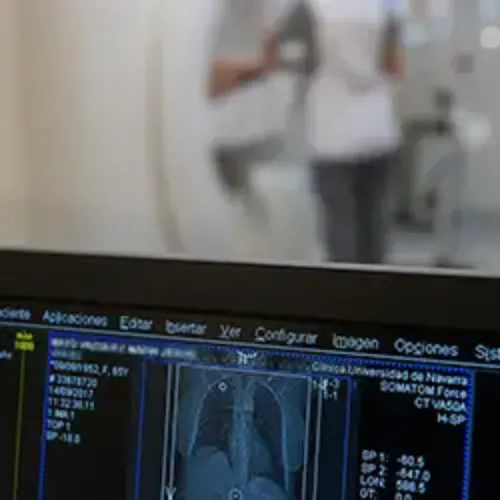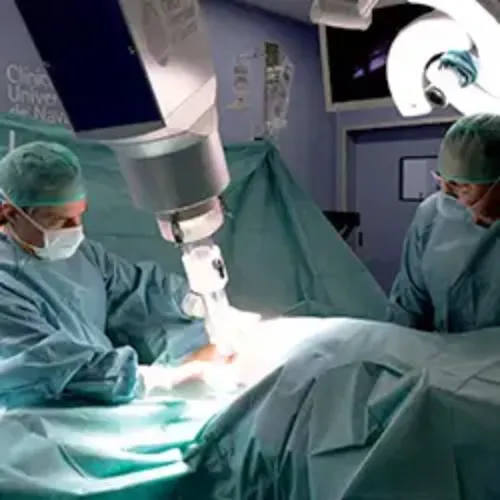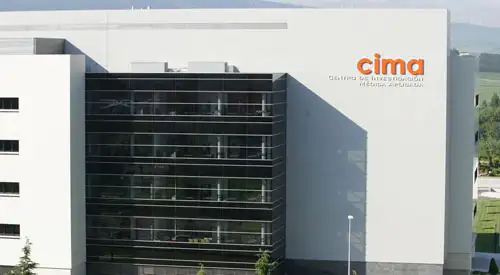Adhesion and Metastasis
"Understanding metastasis in cancer seemed utopian until recently, but its weak point in some tumors is beginning to be discovered. This has a huge impact on the life expectancy of people with cancer".
DR. FERNANDO LECANDA RESEARCHER. ADHESION AND METASTASIS RESEARCH GROUP
The Adhesion and Metastasis Group of the Cima Solid Tumor Program, integrated in the Cancer Center Clínica Universidad de Navarra, aims to understand the molecular level of the intricate genetic and epigenetic programs that confer metastatic and/or recurrent potential, in order to elucidate new vulnerabilities for therapeutic design.
To this end, we have developed syngeneic autologous models of metastatic dissemination by genomic editing with CRISPR/Cas9 in lung cancer and osteosarcoma.
We have also developed new syngeneic models of post-radiation local recurrence in breast cancer where we have identified molecular targets with potential clinical use. For their validation, we are using a multidisciplinary strategy that combines in vitro gene manipulation and gene editing, mouse genetic engineering, "omics" technologies, in vitro functional assays, as well as in vivo monitoring of metastases and recurrences with sophisticated imaging techniques (in vivo bioluminescence and fluorescence, microCT and microPET).
In collaboration with professionals from the Clínica Universidad de Navarra and pharmaceutical companies, we are testing new therapeutic compounds with potential use in these clinical scenarios, with the hope of contributing to an improvement in the life expectancy of patients.

GROUP LEADERS
| Dr. Fernando Lecanda | |
| +34 948 194 700 | Ext. 812028 | |
| flecanda@unav.es | |
| Research profile | |
| Dr. Rafael Martínez Monge | |
| +34 948 194 700 | |
| rmartinezm@unav.es | |
| Research profile | |
Oncology research integrated in the
Cancer Center Clinica Universidad de Navarra

Objectives of our research
To understand the molecular mechanisms that produce the appearance of metastasis in cancer.
Inhibir el desarrollo de metástasis para aumentar el tiempo de supervivencia
Diseñar fármacos capaces de detener la progresión metastásica
FROM THE LABORATORY DIRECTLY TO THE CLINIC
Cutting-edge translational research
In order for our research to reach the cancer patient, we work in very close collaboration with the departments of the Clínica Universidad de Navarra involved in the diagnosis and treatment of cancer. We are part of the Multidisciplinary Areas of the Cancer Center of the Universidad de Navarra (CCUN) and we interact continuously with the Departments of Pediatrics, Pneumology, Oncology, Thoracic Surgery, Neurology, Neurosurgery, Radiology, Anatomic Pathology, Clinical Biochemistry and Nuclear Medicine.

Early detection of lung cancer
Participamos en el programa de detección precoz del cáncer de pulmón de la Clínica Universidad de Navarra.

Immunotherapy combinations
We innovate in the design of new therapeutic strategies that enhance the antitumor response of the immune system, improving its efficacy and clinical applicability.

Potentiation of radiotherapy
We study the mechanisms of response to radiotherapy to maximize its efficacy and minimize side effects in treated individuals.

Would you like to help us?
Thanks to the generosity of many people, the Cima Universidad de Navarra is a reality that strives to offer therapeutic solutions to achieve personalized medicine for patients.
Meet the research team






Scientific activity of the
Adhesion and Metastasis Research Group
Latest scientific publications
- Dual ENPP1/ATM depletion blunts DNA damage repair boosting radioimmune efficacy to abrogate triple-negative breast cancer Aug 13, 2025 | Magazine: Signal Transduction and Targeted Therapy
- DSTYK Inhibition Sensitizes Non-Small Cell Lung Cancer To Taxane-Based Chemotherapy Nov 11, 2024 | Magazine: Journal of Thoracic Oncology
- Signature-driven repurposing of Midostaurin for combination with MEK1/2 and KRASG12C inhibitors in lung cancer Oct 10, 2023 | Magazine: Nature Communications
- The phospholipid transporter PITPNC1 links KRAS to MYC to prevent autophagy in lung and pancreatic cancer May 1, 2023, | Magazine: Molecular Cancer

